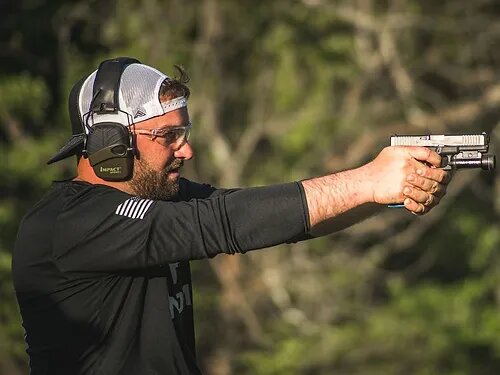Maryland, like many other states in the United States, has specific laws and regulations governing concealed carry permits. If you’re a resident of Maryland or planning to visit the state and want to carry a concealed firearm, it’s crucial to understand the legalities surrounding concealed carry.
This comprehensive guide, provided by PTPGUN, will delve into the important aspects of concealed carry in Maryland, offering you a clear understanding of the rules, application process, and responsibilities associated with carrying a concealed firearm.
Concealed Carry Laws in Maryland
Maryland’s concealed carry laws are governed by the state’s Public Safety Article, specifically §§ 5-301 to 5-311. These laws outline who is eligible to apply for a concealed carry permit, the reasons for which a permit may be granted, and the regulations surrounding the carrying of concealed firearms.
Eligibility: To apply for a concealed carry permit in Maryland, you must meet certain eligibility criteria. You must be at least 18 years old, be a U.S. citizen or a lawful permanent resident, and not have been convicted of certain crimes, including felonies.
Good and Substantial Reason: Maryland is a “may-issue” state, which means that the issuance of concealed carry permits is at the discretion of the issuing authority. Applicants must demonstrate a “good and substantial reason” to carry a concealed firearm. Common reasons include self-defense and protection.
Training Requirement: Maryland also mandates that applicants complete a certified handgun training course, which includes both classroom instruction and live-fire training.
Application Process
Understanding the application process is vital if you’re considering applying for a concealed carry permit in Maryland. The following steps outline the typical process:
Complete Application: Start by obtaining an application form from your local Maryland State Police Licensing Division or download it from their website. Complete the application form in its entirety, ensuring that all information is accurate and up-to-date.
Provide Required Documents: Along with your application, you’ll need to submit various documents, including proof of completion of a certified handgun training course, a valid government-issued photo ID, and any necessary supporting documentation for your “good and substantial reason” to carry concealed.
Fingerprinting: Maryland requires fingerprinting as part of the application process. You’ll need to schedule an appointment with an approved fingerprinting service provider and pay the associated fees.
Interview: Some jurisdictions may require an in-person interview as part of the application process. During the interview, you may be asked about your reasons for applying for a concealed carry permit.
Background Check: The Maryland State Police will conduct a thorough background check, including criminal and mental health records, as part of the application process.
Waiting Period: Be prepared for a waiting period while your application is reviewed. This period can vary depending on your jurisdiction but may take several months.
Notification of Approval or Denial: Once your application is processed, you will be notified of the decision to approve or deny your concealed carry permit. If approved, you will receive instructions on how to obtain your permit.
Good and Substantial Reason
As previously mentioned, Maryland requires applicants to demonstrate a “good and substantial reason” for carrying a concealed firearm. This requirement has been a topic of debate and legal challenges over the years, leading to varying interpretations.
Self-Defense: Self-defense is a commonly cited reason for applying for a concealed carry permit in Maryland. Providing evidence of specific threats or circumstances that justify the need for self-defense is crucial to meeting the “good and substantial reason” requirement.
Protection of Valuables: Some individuals, such as business owners or those who frequently transport valuable items, may cite the protection of valuables as a reason for needing a concealed carry permit.
Work-Related Reasons: In some cases, individuals whose jobs involve carrying large sums of money or other valuables may be granted concealed carry permits for work-related reasons.
Previous Threats or Attacks: If you have been the victim of previous threats or attacks, you may use this as part of your justification for a concealed carry permit.
Reciprocity Agreements
Maryland has limited reciprocity agreements with other states regarding concealed carry permits. It’s essential to be aware of these agreements if you plan to carry your firearm outside of Maryland.
Limited Reciprocity: Maryland only recognizes concealed carry permits issued by a few specific states. If you hold a permit from one of these states, you may be allowed to carry concealed in Maryland, but you must adhere to Maryland’s laws and regulations while doing so.
Consult Maryland’s Handgun Roster: Before carrying your firearm in Maryland, consult the Maryland State Police Handgun Roster to confirm the states with which Maryland has reciprocity agreements.
Places Where Concealed Carry is Prohibited
Even with a valid concealed carry permit, there are places where carrying a concealed firearm is prohibited in Maryland. Understanding these restrictions is crucial to avoid legal issues.
Schools: Maryland law prohibits carrying concealed firearms on school property or on school buses, even with a valid permit.
Government Buildings: Carrying concealed firearms is generally prohibited in government buildings, courthouses, and public transportation facilities.
Private Property: Private property owners have the right to prohibit firearms on their premises. Always respect posted signs and the property owner’s wishes.
Alcohol and Drugs: Carrying a concealed firearm while under the influence of alcohol or drugs is illegal in Maryland.
Federal Facilities: Federal law prohibits carrying concealed firearms in certain federal facilities, such as post offices and federal courthouses.
Responsibilities of Concealed Carry Permit Holders
Holding a concealed carry permit in Maryland comes with specific responsibilities that permit holders must adhere to:
Firearm Safety: Always handle your firearm safely and responsibly. Know how to properly store and secure your weapon when not in use.
Renewal: Concealed carry permits in Maryland are typically valid for two years. Be sure to renew your permit before it expires to avoid carrying illegally.
Notify Law Enforcement: If you are carrying a concealed firearm and are approached by law enforcement, you must inform them that you have a concealed carry permit and are armed.
Stay Informed: Keep up to date with changes in Maryland’s concealed carry laws and regulations. Ignorance of the law is not a valid defense.
Travel Responsibly: If you plan to carry your firearm outside of Maryland, research and comply with the laws of the states you will be visiting. Reciprocity agreements can change, so stay informed.
Legal Consequences of Violating Concealed Carry Laws
Violating concealed carry laws in Maryland can lead to serious legal consequences. It’s crucial to understand these consequences to avoid putting your rights and freedom at risk.
Criminal Charges: Carrying a concealed firearm without a valid permit or in prohibited locations can result in criminal charges, including fines and imprisonment.
Revocation of Permit: If you are found to have violated concealed carry laws, your permit may be revoked, and you may be ineligible to apply for a new one.
Loss of Firearm Rights: A conviction related to firearms violations can result in the loss of your right to possess firearms in the future.
Civil Lawsuits: If your actions result in harm to others or property damage, you may be subject to civil lawsuits, leading to significant financial liabilities.
Legal Assistance and Resources
Navigating the legalities of concealed carry in Maryland can be complex. If you have questions or concerns about your rights and responsibilities, consider seeking legal assistance. Consult with an attorney experienced in firearms and Second Amendment law to ensure you fully understand and comply with the state’s regulations.
Conclusion
Understanding the legalities of concealed carry in Maryland is essential for responsible firearm owners. Maryland’s laws are specific and stringent, and compliance is crucial to avoid legal issues. Remember that the concealed carry application process, “good and substantial reason” requirement, and reciprocity agreements can change, so staying informed and up to date is key. By adhering to the law, practicing firearm safety, and being a responsible permit holder, you can exercise your Second Amendment rights while respecting the laws and regulations of the state of Maryland.





